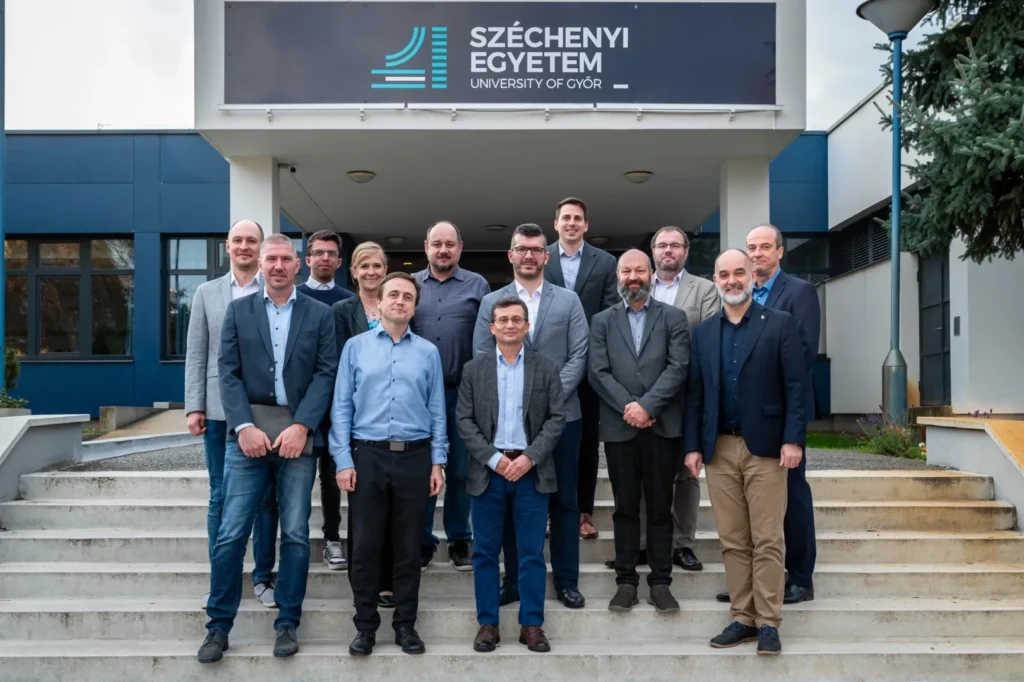Created: 2025.11.24. 11:25
Brigadier General, Dr Ferenc Molnár, a senior staff member of the NATO Defence College and honorary university professor at the Ludovika University of Public Service, recently presented the institution’s education activities and experiences, as well as the importance of civil–military cooperation from the perspective of NATO leadership, at the Deák Ferenc Faculty of Law and Political Sciences of Széchenyi István University.
Following the welcome address by Dr Péter Smuk, Dean of the Faculty, Lieutenant Colonel Dr Ádám Farkas, Senior Research Fellow at the Department of Modern Technology and Cybersecurity Law at Széchenyi István University and at the Institute of National Security of the Ludovika University of Public Service, introduced the speaker. Brigadier General, Dr Ferenc Molnár has several decades of military and higher education teaching and research experience. After completing his qualification as a mechanised infantry officer, he obtained a degree in sociology at Eötvös Loránd University, followed by a degree in security policy at the United States Naval Postgraduate School, all while serving as an active-duty officer. He earned both his PhD and habilitation in the field of military sciences at the Zrínyi Miklós National University of Defence. During his military career, he held several positions in the Ministry of Defence, and served for four years as Faculty Adviser at the NATO Defence College, while also gaining international experience at the ISAF headquarters in Kabul and the NATO command in Sarajevo. Since 2020 he has been carrying out leadership duties in Rome as Director for Academic Planning at the NATO Defence College. He secured this position through a competitive application process, and after completing his first term, he was appointed for a second one, making him a key figure in NATO’s colonel-, general-, ambassador- and diplomatic-level programmes for half a decade.

Dr Molnár began his lecture with an introduction to the NATO Defence College, which was founded in 1951 and whose main tasks include organising educational programmes and conducting research that supports education as well as NATO’s highest-level decision-making forums. He explained that lecturers are invited from all over the world according to a curriculum adapted to the changing security and geopolitical environment, and that the institution annually receives around 600 students and 600 visitors from approximately 40 countries. He emphasised that NATO’s dual nature—as a military and political alliance—clearly manifests itself in the educational activities as well. He underlined that instead of a dominance of specialised, strictly military lectures and narrowly focused expert perspectives, the curriculum is defined more by methods that promote strategic thinking, security interpretation, diplomacy, sectoral policymaking and cooperation. The applied methodology includes numerous forward-looking elements that allow for the acquisition of high-level knowledge. One such element is that the institution does not have a permanent teaching staff; instead, it works with internationally recognised invited experts who possess both academic and practical experience. This ensures that the curriculum can be adapted to current and future topics. The learning process also places great emphasis on compulsory and recommended readings requiring preliminary preparation and in-depth understanding; on informal discussions and debates during lectures and coffee breaks; on presentation and debate moderation tasks aimed at realism and consensus building; and on Q&A sessions, many of which are based on work carried out in 10–11 person committees.
The role of these working groups is not limited to short-term tasks; on the contrary, long-term project work is of key importance during the programmes, and such projects must be presented and defended at the end of the course. In these projects—typically addressing current security challenges—ongoing cooperation across cultures and disciplines is required from topic selection through development to presentation. The experience gained during this cooperation can be just as valuable—if not more so—than the resulting documents, some of which are occasionally used in alliance-level policy-making. As an example, he mentioned that before the international identification of the Russian “shadow fleet”, an analysis produced at the College already anticipated its potential application and subsequent operation.
During the lecture, Brigadier General, also presented the organisational structure of the NATO Defence College’s research activities. He explained that the research department is responsible for preparing concise, relevant and strategically important studies for NATO and member-state decision-makers, as well as for carrying out project work supporting education. Their activities correspond to NATO’s strategic priorities and even contribute to expanding them, including the increasingly relevant field of “foresight” analysis. He also highlighted that, in addition to teaching and research, international cooperation plays a significant role, with the College having established credit recognition agreements with several universities, including institutions in Italy and the United Kingdom. He added that researchers from various NATO member states regularly join the College for several months, which could also serve as an opportunity for Hungarian higher education institutions.
The closing message of the lecture stressed that integrating civil and military expertise is essential for national and alliance security. He pointed out that in Eastern Europe, many defence-related competencies faded from the civil sphere after the Cold War, whereas in Western Europe there is a strong tradition of teaching defence-related subjects at civilian universities, and military higher education programmes also involve experts who research and teach civilian topics. This model, he suggested, could also be of interest to Hungarian universities. With regard to the increasingly dynamic security challenges, he noted that these require theoretical and practical synergies between defence and civilian expertise, as well as closer collaboration between the two fields. He expressed his hope that this lecture had contributed to promoting these aspirations within Hungarian circumstances.






